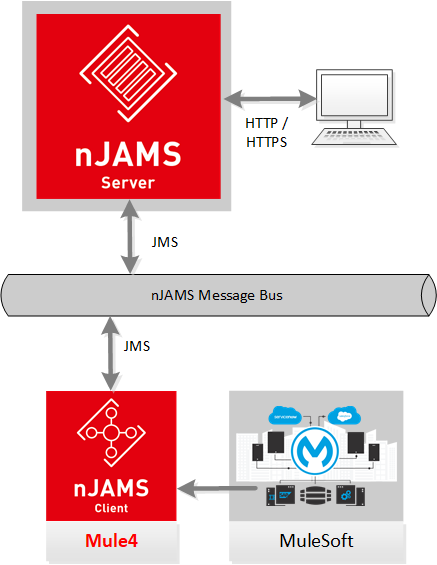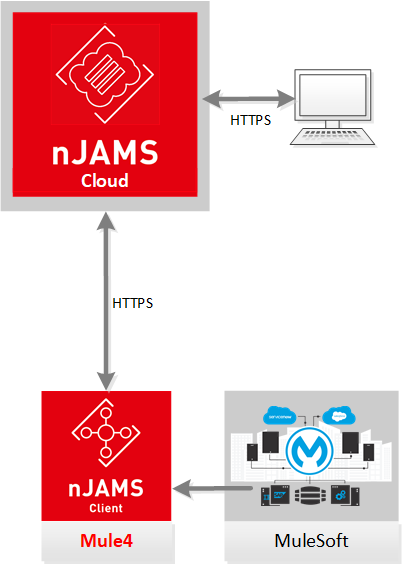Introduction#
nJAMS Client for Mule4 extends the nJAMS family with a client software that enables the monitoring of MuleSoft Runtime Engine flow executions.
How does nJAMS Client for Mule4 work?#
nJAMS Client for Mule4 is a full featured nJAMS Client. nJAMS Client for Mule4 collects execution information from flows of MuleSoft Runtime Engine such as execution times, duration, executed path, recorded input/output data, etc. All this monitoring information from nJAMS Client for Mule4 is provided to nJAMS Server, respectively nJAMS Cloud, where the data can be searched and inspected. A user can query for monitoring data by using nJAMS User Interface. For example, a user can search for a particular flow instance and see details of processing the flow of a MuleSoft Runtime Engine application:
nJAMS Client for Mule4 supports both on-premise and MuleSoft CloudHub deployments.
nJAMS Client for Mule4 interacts with nJAMS nJAMS Server or nJAMS Cloud. If you prefer to run nJAMS on-premise, you will choose to install and maintain an nJAMS Server instance on your local machines. On the other hand, if you already use MuleSoft CloudHub you would probably also want to use nJAMS as a Service and go for nJAMS Cloud. See the different architectures depending on where nJAMS is hosted.
- nJAMS Client for Mule4 in association with nJAMS Server:

nJAMS Client for Mule4 provides monitoring data to an nJAMS Server instance by sending event messages using JMS transport. nJAMS Client for Mule4 supports various JMS Provider, e.g. ActiveMQ. nJAMS Server receives JMS event messages and stores them into its persistence layer (Elasticsearch Cluster). The monitoring data is presented in nJAMS user interface. A user can log in into nJAMS Server web application and search for monitoring events.
- nJAMS Client for Mule4 in association with nJAMS Cloud:

With regards to nJAMS Cloud, nJAMS Client for Mule4 provides monitoring data to a dedicated nJAMS Cloud instance. The monitoring data is again sent via event messages. However, when using nJAMS Cloud, HTTPS is used as transport protocol. An nJAMS Cloud instance receives event messages and provides a web application to view monitoring data.
What is required to use nJAMS Client for Mule4?#
nJAMS Client for Mule4 acts as an extension (bean) to the MuleSoft Runtime Engine and runs inside the same JVM. For this reason nJAMS Client for Mule4 is required to be installed on the same machine, where MuleSoft Runtime Engine is running.
Furthermore, nJAMS Client for Mule4 requires an nJAMS Server instance, respectively an nJAMS Cloud instance.
